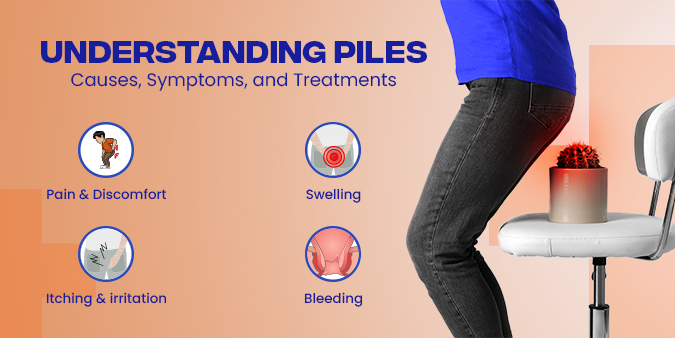
Understanding Piles: Causes, Symptoms, and Treatments
Tuesday, 4th June 2024Dealing with piles can be a painful and often embarrassing issue, but it’s more common than you might think. Understanding the causes, symptoms, and treatments of piles is the first step toward finding relief. Let’s dive into everything you need to know about piles, in a way that’s easy to understand and relevant to your needs.
What Are Piles?
Piles, also known as hemorrhoids, are swollen veins in the lowest part of your rectum and anus. Sometimes the walls of these blood vessels stretch so thin that the veins bulge and get irritated, especially when you have a bowel movement.
Causes of Piles
The exact cause of piles is often unknown, but several factors can contribute to their development. These include:
- Chronic Constipation: Straining during bowel movements can cause the veins in your anus to swell.
- Diarrhea: Repeated episodes of diarrhea can also lead to piles.
- Sitting for Long Periods: Staying seated for long stretches, especially on the toilet, can cause piles.
- Heavy Lifting: Regularly lifting heavy objects can put extra pressure on your rectal veins.
- Pregnancy: The increased pressure on your abdomen during pregnancy can lead to piles.
Common Symptoms of Piles
Piles can present a variety of symptoms, which can vary in severity. Common symptoms include:
- Pain or discomfort: This is usually more noticeable during or after a bowel movement.
- Itching or irritation: The skin around your anus may feel itchy or irritated.
- Swelling: You might notice lumps around your anus.
- Bleeding: Small amounts of bright red blood are often seen on toilet paper or in the toilet bowl.
- Leakage: Some people experience difficulty in controlling their bowel movements.
Types of Piles
Piles can be classified into two main types:
- Internal Piles: Located inside the rectum, these are usually not visible and typically painless but can cause bleeding.
- External Piles: Located under the skin around the anus, these can be itchy or painful and may sometimes bleed.
Diagnosing Piles
Diagnosing piles usually involves a physical examination. Your doctor may perform:
- Visual Examination: To look for external piles.
- Digital Rectal Examination (DRE): To feel for abnormalities within the rectum.
- Anoscopy or Proctoscopy: To get a closer look inside the rectum and anus.
Home Remedies for Piles
Many people find relief from piles through simple home remedies. Here are some effective methods:
- Fiber-rich Diet: Eating plenty of fruits, vegetables, and whole grains can help soften stool.
- Hydration: Drinking enough water can prevent constipation.
- Warm Baths: Sitting in warm water for 10-15 minutes can soothe irritation.
- Topical Treatments: Over-the-counter creams and ointments can provide temporary relief.
Medical Treatments for Piles
If home remedies are not effective, medical treatments can help. These include:
- Medications: Prescribed creams, ointments, or suppositories can reduce swelling and discomfort.
- Minimally Invasive Procedures: Techniques such as rubber band ligation, sclerotherapy, or infrared coagulation can be effective for smaller piles.
Surgical Options for Piles
For severe or persistent piles, surgical options may be necessary. These include:
- Hemorrhoidectomy: Surgical removal of piles.
- Stapled Hemorrhoidopexy: A procedure that cuts off the blood flow to piles, causing them to shrink.
- Laser Surgery: A less invasive option using laser technology to treat piles.
How to Prevent Piles
Preventing piles involves lifestyle changes to reduce the strain on your rectal veins:
- Regular Exercise: Staying active can help prevent constipation.
- Healthy Diet: A diet high in fiber and fluids can keep stools soft.
- Avoid Straining: Don’t delay bowel movements and avoid straining.
- Proper Hydration: Drink plenty of water throughout the day.
Why Choose Shriram Hospital for Piles Treatment?
At Shriram Hospital, we understand the discomfort and distress caused by piles. Our expert team of piles specialists provides comprehensive and compassionate care to help you find relief. Here’s why you should choose us:
- Experienced Specialists: Our team includes some of the best piles doctors in Delhi, dedicated to providing top-notch care.
- Advanced Treatments: We offer the latest medical and surgical treatments for piles, including minimally invasive procedures.
- Personalized Care: We tailor our treatment plans to meet the unique needs of each patient, ensuring the best possible outcomes.
For the best piles treatment in Delhi, visit us at Shriram Hospital, located at B-14 Shankar Garden, Vikaspuri, Main Najafgarh Road, New Delhi - 110018.
Contact Us:
- Phone: +91 79733-04050 | 62623-04050
- Email: admin@shriramhospitals.co.in
Conclusion
Piles can be a painful and uncomfortable condition, but understanding the causes, symptoms, and available treatments can help you manage and even prevent them. Whether you’re looking for home remedies, medical treatments, or expert care at the best hospital for piles treatment in Delhi, Shriram Hospital is here to help.


